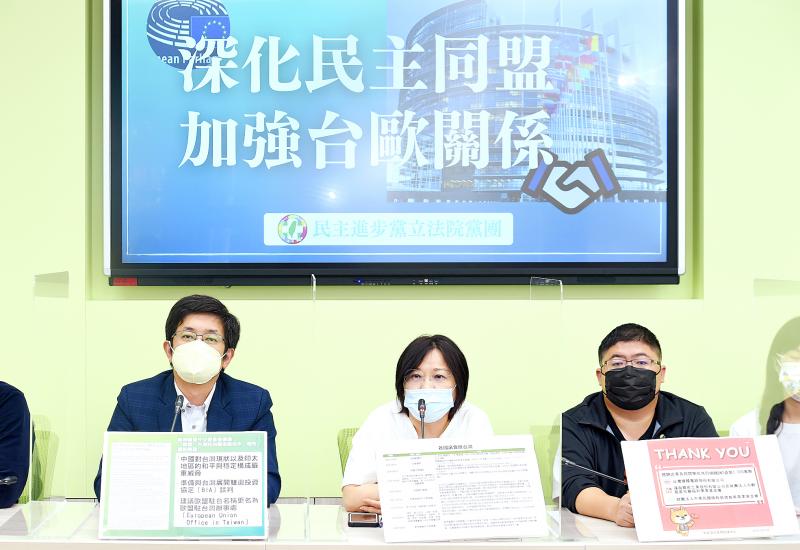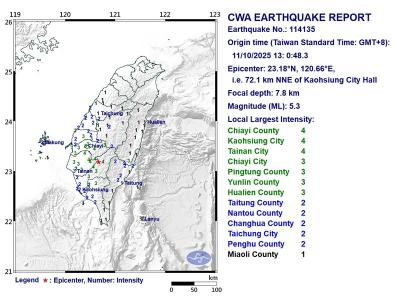The Democratic Progressive Party (DPP) yesterday denounced accusations that squabbles among party factions are affecting its governance, while also calling for bipartisan progress toward constitutional reform.
Pundits have lately been decrying what they call “factional governance” within the DPP, citing increasingly forceful orders to remove the NT$1,000 fee for Quintuple Stimulus Vouchers, prioritize teenagers for the Pfizer-BioNTech COVID-19 vaccine and other matters.
One DPP faction comprises lawmakers closer to President Tsai Ing-wen (蔡英文), reportedly led by DPP Legislator Chen Ming-wen (陳明文). Other active factions within the party include members closer to Premier Su Tseng-chang (蘇貞昌) and those categorized as the New Tide faction.

Photo: Liao Chen-huei, Taipei Times
Asked whether there is a deepening rift between factions, DPP caucus director-general Liu Shyh-fang (劉世芳) told a virtual morning news conference that policymakers seek diverse input from party headquarters, as well as legislators.
“Everyone knows that every legislator comes from a different electorate, so they represent different voter opinions” when forming a consensus, she said.
Factions communicate with each other to reach the best solutions for public policy, but many people who do not understand this process use it as a tool for criticism, she added.
Many different opinions coexist in a democracy, Liu said, dismissing the disagreements as insignificant compared with the party’s unity.
Reporters also asked about a meeting held yesterday with Taoyuan Mayor Cheng Wen-tsan (鄭文燦) regarding constitutional reform, wondering whether opposition from other parties would stymie progress.
The DPP has three working groups dedicated to constitutional reform issues, including lowering the voting age from 20 to 18 and codifying human rights into the Constitution, Liu said.
Each group has concluded deliberations and would soon send drafts to party caucuses, she said.
Calling the legislature a high barrier to cross, Liu urged other parties to present their own versions so that they could work together to fulfill public expectations for constitutional reform.
Many young people are concerned about the voting age issue and every party has mentioned it in their expectations for the new legislative session, DPP Legislator Hung Sun-han (洪申翰) said.
The DPP therefore does not fear backlash from other parties, he said, adding that the most important thing is to exchange views and reach a consensus.
Hung in particular called on the Chinese Nationalist Party (KMT) to put forth its own proposals and refrain from obstructionism, as it does not reflect the will of the people.
Constitutional reform is a major undertaking that concerns the rights of all citizens and therefore requires the full cooperation of all parties involved, especially if it is to make it onto the ballot by next year, DPP Legislator Chen Hsiu-pao (陳秀寶) said.
DPP working groups are putting together proposals that, after approval, are to be sent to party caucuses for deliberation, she said.
Only once the caucuses pass a unified version could the constitutional amendment process begin, Chen added.

The Central Weather Administration (CWA) today issued a sea warning for Typhoon Fung-wong effective from 5:30pm, while local governments canceled school and work for tomorrow. A land warning is expected to be issued tomorrow morning before it is expected to make landfall on Wednesday, the agency said. Taoyuan, and well as Yilan, Hualien and Penghu counties canceled work and school for tomorrow, as well as mountainous district of Taipei and New Taipei City. For updated information on closures, please visit the Directorate-General of Personnel Administration Web site. As of 5pm today, Fung-wong was about 490km south-southwest of Oluanpi (鵝鑾鼻), Taiwan's southernmost point.

Almost a quarter of volunteer soldiers who signed up from 2021 to last year have sought early discharge, the Legislative Yuan’s Budget Center said in a report. The report said that 12,884 of 52,674 people who volunteered in the period had sought an early exit from the military, returning NT$895.96 million (US$28.86 million) to the government. In 2021, there was a 105.34 percent rise in the volunteer recruitment rate, but the number has steadily declined since then, missing recruitment targets, the Chinese-language United Daily News said, citing the report. In 2021, only 521 volunteers dropped out of the military, the report said, citing

A magnitude 5.3 earthquake struck Kaohsiung at 1pm today, the Central Weather Administration said. The epicenter was in Jiasian District (甲仙), 72.1km north-northeast of Kaohsiung City Hall, at a depth of 7.8km, agency data showed. There were no immediate reports of damage. The earthquake's intensity, which gauges the actual effects of a temblor, was highest in Kaohsiung and Tainan, where it measured a 4 on Taiwan's seven-tier intensity scale. It also measured a 3 in parts of Chiayi City, as well as Pingtung, Yunlin and Hualien counties, data showed.

Nearly 5 million people have signed up to receive the government’s NT$10,000 (US$322) universal cash handout since registration opened on Wednesday last week, with deposits expected to begin tomorrow, the Ministry of Finance said yesterday. After a staggered sign-up last week — based on the final digit of the applicant’s national ID or Alien Resident Certificate number — online registration is open to all eligible Taiwanese nationals, foreign permanent residents and spouses of Taiwanese nationals. Banks are expected to start issuing deposits from 6pm today, the ministry said. Those who completed registration by yesterday are expected to receive their NT$10,000 tomorrow, National Treasury